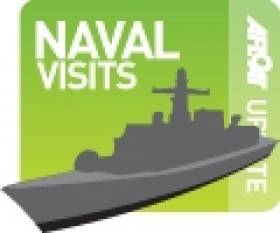Displaying items by tag: Naval Visitor
Former ‘Privately’ Owned Offshore Patrol Vessel Visits Dublin Port
#NAVAL VISIT- Having visited Cork last month, The Royal Navy's River class offshore patrol vessel OPV HMS Mersey (P283) is currently moored in Dublin Port, the ship belongs to a trio of sisterships purchased in a £39m deal, writes Jehan Ashmore.
HMS Mersey along with OPV's Severn and Tyne have for nearly the last decade served the Fishery Protection Squadron while on 'loan' to the Royal Navy. They had operated on a rolling five-year term lease from the shipbuilder-owners, Vosper Thornycroft, now part of BAE Systems.
The lease was due to be renewed in 2013 but rather than face having to pay more to rent the trio of vessels for £7m a year, the UK government signed the contract to buy the ships outright, keeping them in service with the Royal Navy for the next ten years.
The Portsmouth based OPV's known as the 'Cod' squadron are hard-working vessels, where each vessel conducts fishery patrol duties for 275 days annually. In addition they are assigned to perform tasks such as maritime security, counter terrorism, tackling smuggling, fire-fighting and SAR missions.






























































